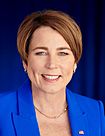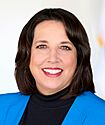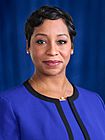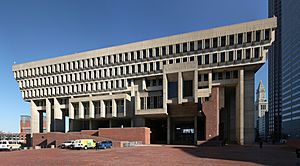Government of Massachusetts facts for kids

|
|
| Polity type | Presidential republic Federated state |
|---|---|
| Constitution | Constitution of Massachusetts |
| Legislative branch | |
| Name | General Court |
| Type | Bicameral |
| Meeting place | Massachusetts State House |
| Upper house | |
| Name | Senate |
| Presiding officer | Karen Spilka, President |
| Lower house | |
| Name | House of Representatives |
| Presiding officer | Ronald Mariano, Speaker |
| Executive branch | |
| Head of State and Government | |
| Title | Governor |
| Currently | Maura Healey |
| Appointer | Election |
| Cabinet | |
| Name | 9 Executive Agencies |
| Leader | Governor |
| Deputy leader | Lieutenant Governor |
| Headquarters | State House |
| Judicial branch | |
| Name | Judiciary of Massachusetts |
| Chief Justice | Kimberly S. Budd |
| Courts | Courts of Massachusetts |
| Massachusetts Supreme Judicial Court | |
| Chief judge | Kimberly S. Budd |
| Seat | Suffolk County Courthouse, Boston |
Massachusetts is a state in the United States with its own government. This government follows rules set out in the state constitution. The main parts of the government are the legislative, executive, and judicial branches.
The legislative branch makes laws. It's called the General Court and has two parts: the Senate and the House of Representatives. The executive branch carries out the laws. It's led by the Governor and other elected officials. The judicial branch explains the laws. This branch includes the Supreme Judicial Court and other courts.
The capital city of Massachusetts is Boston. The main government buildings are on Beacon Hill.
Contents
How Massachusetts Connects to the U.S. Government
Massachusetts in Congress
Massachusetts sends people to the U.S. Congress in Washington, D.C. This is how the state is represented in the national government.
Each state elects two senators to the Senate. Massachusetts also elects a number of representatives to the House of Representatives. The number of representatives depends on the state's population. Based on the 2010 U.S. Census, Massachusetts has nine representatives. Currently, all these officials are from the Democratic Party.
 Massachusetts Members of Congress |
||||||
| Part of Congress | District | Official | Party | Term Started | Term Ends | |
|---|---|---|---|---|---|---|
| Senate | Statewide | Elizabeth Warren | Democrat | 2019 | 2025 | |
| Ed Markey | Democrat | 2021 | 2027 | |||
| House of Representatives | 1st | Richard Neal | Democrat | 2023 | 2025 | |
| 2nd | Jim McGovern | Democrat | ||||
| 3rd | Lori Trahan | Democrat | ||||
| 4th | Jake Auchincloss | Democrat | ||||
| 5th | Katherine Clark | Democrat | ||||
| 6th | Seth Moulton | Democrat | ||||
| 7th | Ayanna Pressley | Democrat | ||||
| 8th | Stephen Lynch | Democrat | ||||
| 9th | Bill Keating | Democrat | ||||
Federal Courts in Massachusetts
For federal legal cases, Massachusetts is part of the United States District Court for the District of Massachusetts. Appeals from this court go to the United States Court of Appeals for the First Circuit.
Electoral College Votes
Massachusetts has 11 votes in the Electoral College. These votes help choose the President. The state gives all its votes to the candidate who wins the most votes in Massachusetts.
Executive Branch
The Executive Branch of Massachusetts is led by the Governor. The Governor is in charge of many state departments and agencies. There are also other elected officials who work in the executive branch.
Elected Officials
These officials are chosen by voters and have important jobs in the state government.
 Key Elected Officials |
||||||
| Person | Office | Main Role | Took Office | |||
|---|---|---|---|---|---|---|
| Maura Healey (born 1971) |
Governor | Leads the state government | 5 January 2023 | |||
| Kim Driscoll (born 1966) |
Lieutenant Governor | Helps the Governor | 5 January 2023 | |||
| William F. Galvin (born 1950) |
Secretary of the Commonwealth | Manages elections and public records | 1 January 1995 | |||
| Andrea Campbell (born 1982) |
Attorney General | Chief lawyer for the state | 18 January 2023 | |||
| Deb Goldberg (born 1954) |
Treasurer and Receiver-General | Manages state money | 21 January 2015 | |||
| Diana DiZoglio (born 1983) |
State Auditor | Checks how state money is spent | 18 January 2023 | |||
Governor's Council
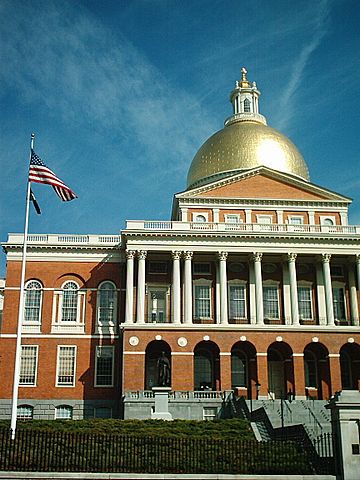
The Governor's Council helps the Governor. It has eight members elected from different areas, plus the Lieutenant Governor. This council approves important appointments, like judges, and helps with other state decisions. The Governor leads the council, but doesn't vote.
Cabinet and State Agencies
The Governor has a team of eleven secretaries, called the cabinet. Each secretary leads an "Executive Office" that manages many state agencies. These agencies handle different parts of government, like health, education, and public safety.
| Main Executive Offices of Massachusetts | |||
|---|---|---|---|
| Office | Secretary | Website | |
| Executive Office of Administration and Finance | Matthew Gorzkowicz | https://www.mass.gov/orgs/executive-office-for-administration-and-finance | |
| Executive Office of Energy and Environmental Affairs | Rebecca Tepper | https://www.mass.gov/orgs/executive-office-of-energy-and-environmental-affairs | |
| Executive Office of Health and Human Services | Kate Walsh | https://www.mass.gov/orgs/executive-office-of-health-and-human-services | |
| Executive Office of Housing and Economic Development | Yvonne Hao | https://www.mass.gov/orgs/executive-office-of-housing-and-economic-development | |
| Executive Office of Labor and Workforce Development | Lauren Jones | https://www.mass.gov/orgs/executive-office-of-labor-and-workforce-development | |
| Executive Office of Public Safety and Security | Terrence Reidy | https://www.mass.gov/orgs/executive-office-of-public-safety-and-security | |
| Executive Office of Technology Services and Security | Jason Snyder | https://www.mass.gov/orgs/executive-office-of-technology-services-and-security | |
| Executive Office of Education | Patrick Tutwiler | https://www.mass.gov/orgs/executive-office-of-education | |
| Executive Office of Transportation and Public Works | Gina Fiandaca | https://www.mass.gov/orgs/massachusetts-department-of-transportation | |
Legislative Branch
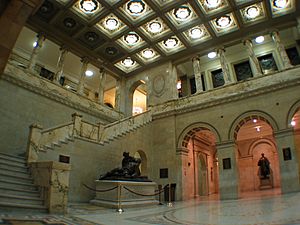
The state legislature is called the Massachusetts General Court. It makes the laws for Massachusetts. It has two parts:
- The Senate has 40 members.
- The House of Representatives has 160 members.
Members of both houses serve for two years. The leader of the House is called the Speaker. The leader of the Senate is called the President.
For a bill to become a law, it must be approved by both parts of the General Court and signed by the Governor. If the Governor doesn't sign it, the General Court can still make it a law if two-thirds of both houses vote for it again.
| Senate Leaders | House Leaders | ||
|---|---|---|---|
 |
President ▌Karen Spilka (D) |
 |
Speaker of the House ▌Ronald Mariano (D) |
 |
President pro tempore ▌Will Brownsberger (D) |
 |
Speaker pro tempore ▌Kate Hogan (D) |
 |
Majority Leader ▌Cynthia Stone Creem (D) |
 |
Majority Leader Michael Moran (D) |
 |
Minority Leader ▌Bruce Tarr (R) |
 |
Minority Leader ▌Bradley Jones Jr. (R) |
Judicial Branch
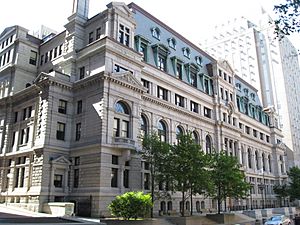
The judicial branch explains and applies the laws of Massachusetts. It makes sure everyone gets fair treatment under the law. The court system includes the Supreme Judicial Court, the Appeals Court, and several trial courts.
Supreme Judicial Court
The Supreme Judicial Court is the highest court in Massachusetts. It oversees the entire court system. Besides hearing appeals, it also sets rules for how courts operate and for lawyers. It can also give advice to the Governor and legislature on legal questions.
| Position | Name | Born | Started Service | Appointed by | Law School |
|---|---|---|---|---|---|
| Chief Justice | Kimberly S. Budd | October 23, 1966 | December 1, 2020 | Charlie Baker | Harvard |
| Senior Associate Justice | Frank Gaziano | September 8, 1963 | August 18, 2016 | Charlie Baker | Suffolk |
| Associate Justice | Scott L. Kafker | April 24, 1959 | August 21, 2017 | Charlie Baker | Chicago |
| Associate Justice | Dalila Argaez Wendlandt | 1968/1969 (age 56–57) | December 4, 2020 | Charlie Baker | Stanford |
| Associate Justice | Serge Georges Jr. | 1969/1970 (age 55–56) | December 16, 2020 | Charlie Baker | Suffolk |
| Associate Justice | Bessie Dewar | July 4, 1980 | January 16, 2024 | Maura Healey | Yale |
| Associate Justice | Gabrielle Wolohojian | December 16, 1960 | Designate | Maura Healey | Columbia |
Appeals Court
The Appeals Court reviews decisions made by the lower trial courts. It has a chief justice and twenty-four other justices.
Trial Courts
These are the courts where cases are first heard. Massachusetts has several types of trial courts:
- Superior Court
- District Court
- Land Court
- Housing Court
- Juvenile Court
- Probate and Family Court
- Boston Municipal Court
County Government
Most county governments in Massachusetts were removed in the 1990s and 2000s. However, some parts of county government still exist, mainly in the southeastern part of the state. For example, District Attorneys and Sheriffs are elected based on county areas. Sheriffs run jails and help with legal paperwork.
Sheriffs
| County | Sheriff | Party | Website |
|---|---|---|---|
| Barnstable | Donna D. Buckley | Democrat | Link |
| Berkshire | Thomas Bowler | Democrat | Link |
| Bristol | Paul Heroux | Democrat | Link |
| Dukes | Robert Ogden | Democrat | Link |
| Essex | Kevin Coppinger | Democrat | Link |
| Franklin | Christopher Donelan | Democrat | Link |
| Hampden | Nick Cocchi | Democrat | Link |
| Hampshire | Patrick Cahillane | Democrat | Link |
| Middlesex | Peter Koutoujian | Democrat | Link |
| Nantucket | James Perelman | Democrat | Link |
| Norfolk | Patrick W. McDermott | Democrat | Link |
| Plymouth | Joseph McDonald, Jr. | Republican | Link |
| Suffolk | Steven Tompkins | Democrat | Link |
| Worcester | Lewis Evangelidis | Republican | Link |
District Attorneys
District attorneys are elected in 11 districts. They act as public lawyers for the state in criminal cases. Most district attorneys work within one county.
| District (Counties) | District Attorney | Party | Website |
|---|---|---|---|
| Berkshire District | Andrea Harrington | Democrat | Link |
| Bristol District | Thomas Quinn, III | Democrat | Link |
| Cape and Islands District (Barnstable, Dukes, Nantucket) | Michael O'Keefe | Republican | Link |
| Eastern District (Essex) | Jonathan Blodget | Democrat | Link |
| Hampden District | Anthony Gulluni | Democrat | Link |
| Middle District (Worcester) | Joseph Early | Democrat | Link |
| Norfolk | Michael Morrissey | Democrat | Link |
| Northern (Middlesex) | Marian Ryan | Democrat | Link |
| Northwestern (Hampshire, Franklin) | David Sullivan | Democrat | Link |
| Plymouth | Timothy Cruz | Republican | Link |
| Suffolk | Kevin Hayden | Democrat | Link |
Registry of Deeds
Every county in Massachusetts has at least one registry of deeds. This office keeps records of property ownership, like deeds and titles. Each registry is run by an elected official called a register of deeds, who serves a six-year term.
Local Government
Massachusetts has a unique way of organizing local government, shared with other New England states. All land in Massachusetts belongs to either a city or a town. There are no areas that are not part of a city or town.
Cities and towns have the power to make their own local rules, but these rules must follow state laws. The state constitution gives cities and towns the right to govern themselves on local issues.
Elections and Politics
Massachusetts is known for its progressive politics. This means many people in the state support ideas that aim to improve society and protect individual rights. It is a strong area for the Democratic Party.
Transparency in Government
Massachusetts has laws to make sure government information is open to the public. These include an open-meeting law and a public-records law. These laws help people see what their government is doing. A new law in 2017 made it easier and cheaper for people to get government records.
See also
 | Delilah Pierce |
 | Gordon Parks |
 | Augusta Savage |
 | Charles Ethan Porter |


